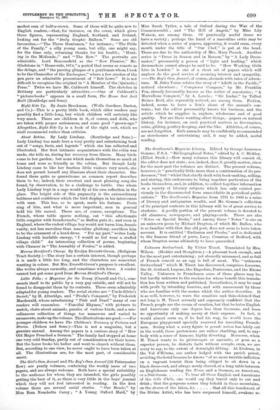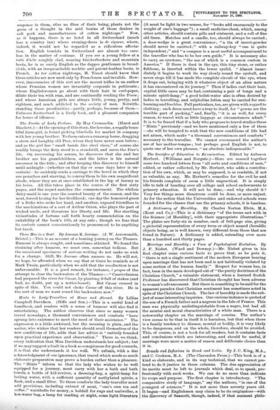Unknown Switzerland. By Victor Tissot. Translated by Mrs. Wilson. (Hodder
and Stoughton.)—A pleasant book enough, and for the most part entertaining; yet absurdly misnamed, and as full of French conceit as an egg is full of meat. The "unknown Switzerland" which M. Tissot has discovered, comprises Lucerne, the St. Gothard, Lugano, the Engadine, Pontresina, and the Rhone Valley. Unknown to Frenchmen some of these places may be, but hardly unknown to the readers for whose benefit this transla- tion has been written and published. Nevertheless, it may be read with profit by intending tourists, and with amusement by those who are familiar with the scenes which the author describes. It is as well, however, to warn the sensitive and thin-skinned that not long is M. Tissot serenely and supremely confident that the French people are the cream of creation, but that he hates English and Americans only one degree less than Germans, and loses no opportunity of making merry at their expense. In fact, it would almost seem as, if he had his way, he would have the European playground specially reserved for travelling French- men. Seeing what a sorry figure la grand.e nation has lately cut in the world, these pretensions are rather startling, and, to any- body with a sense of humour, highly diverting. Moreover, when M. Tissot wants to be picturesque or sarcastic, or pose as a superior person, he distorts facts without scruple, even, we are sorry to say, to the extent of downright fibbing. At Evolena, in the Val d'Herens, our author lodged with the parish priest, avoiding the hotel because he knows "of no more terrible infliction on a vagrant tourist than being obliged to sit down in a black dress-coat, and always newly shaved, at a long table between an Englishman reading the Times and a German, an American, or a Dutchman To hear all those English and Americans of the table d'hote, one would say they travel only to eat and drink ; that the gorgeous scenes they behold in those mountains,
on the shores of the lakes, &c that all this handiwork of the Divine Artist, who has here surpassed himself, awakens no
response in them, stirs no fibre of their being, plants not the germ of a thought in the arid brains of those dealers in salt pork and manufacturers of cotton nightcaps." Now, as it happens, there is no hotel in all Switzerland (much less a country inn) where evening-dress is de rigueur, where, indeed, it would not be regarded as a ridiculous affecta- tion. English tourists in Switzerland are almost too care- less in the matter of costume. If you see a young fellow at a table d'h6te roughly clad, wearing knickerbockers and mountain boots, he is as surely English as the dapper gentleman in broad- cloth, with an irreproachable necktie and patent-leather boots, is French. As for cotton nightcaps, M. Tissot should know that these articles are now used only by Frenchmen and invalids. How- ever, inaccuracies of this sort are the merest trifles in an author whose Prussian women are invariably corporals in petticoats ; whose Englishwomen go about with their hair in curl-paper, dilute their tea with rum, and are continually reading the Times ; and whose American girls are always little, young, pretty, and eighteen, and much addicted to the society of men. Notwith- standing these peculiarities—partly, perhaps, because of them— Unknown Switzerland is a lively book, and a pleasant companion for hours of idleness.



















































 Previous page
Previous page